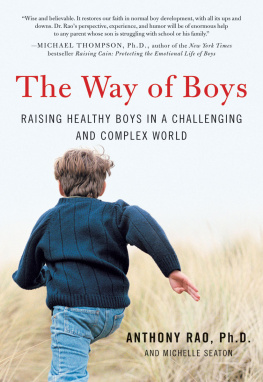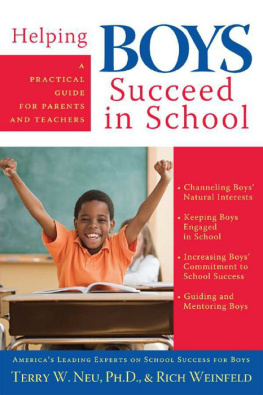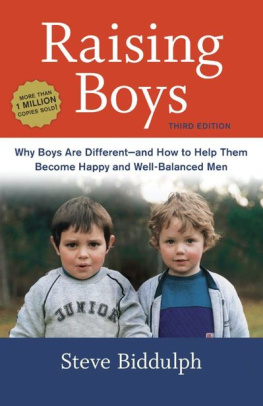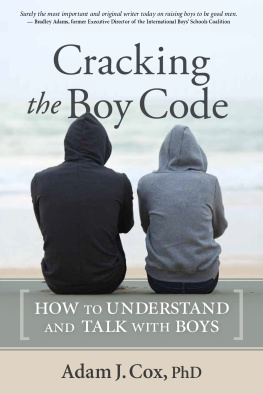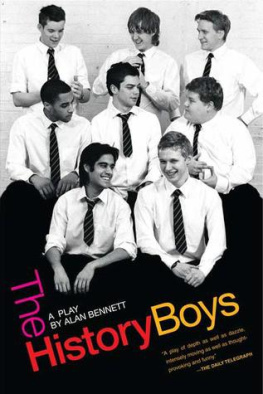Beyond the
ICARUS
FACTOR
Releasing the
Free Spirit of Boys
RICHARD HAWLEY, Ph.D.

Park Street Press
Rochester, Vermont
Save him, save him! cried Wendy looking with horror at the cruel sea far below. Eventually Peter would dive through the air, and catch Michael just before he could strike the sea, and it was lovely the way he did it, and you felt it was his cleverness that interested him and not the saving of human life.
J. M. BARRIE, PETER PAN
PROLOGUE
THE OBSERVATIONS AND arguments posed in this book are based on a single, urgent assumption: that we have created a culture that cannot by its very nature understand children and nurture them to their full realization. We have arrived at this condition through no lack of journalistic or therapeutic attention to the problem. Indeed the proliferation of analysis and proposed remedies for the various ways in which children are failing to thrive is symptomatic of what is wrong. For more than a decade there has been a mounting tide of mass market books devoted to imperiled children, to newly noted pathologies and dysfunctions, to therapeutic strategies. Headlines and cover stories in newspapers and news weeklies are full of sensational claims about childrens declining scholastic competence and the rising incidence of addictions, illnesses, and antisocial behavior.
A common feature to these alarming reports is that they carry with them no promise of remedy or improvement, nor do they deliver any. There is a reason for this, a reason common to all rampant, seemingly ubiquitous social problems that defy solutionand that is that the analysts and pundits are thinking with, not about, the assumptions that are causing the problem. At the heart of this increasingly normative inability to understand children is that their putative problems and crises are seen and reflexively responded to as failures of children to articulate smoothly into the established cultural order. What is proposed here is an invitation to look at children and the culture in which they are embedded in a different way. Although seemingly simple, this invitation to reconsider and reorient ourselves to children is radical in its implications. It requires beginning with a loving and attentive witness to childrento what they are like and to how their experiences unfold. We must undertake this witness of children prior to and independently of any cultural expectations and designs on them. It is proposed here that our collective problem is not that children are failing to serve the culture, but that the culture is failing to serve childrenfailing even to acknowledge the most elemental things about them.
A world good for and fit for children may indeed be the world most worth having generally. Contemporary children, however, even those who dwell in the most technologically advanced and economically prosperous societies, cannot be said to be thriving. It has long been normative, first among psychologists and now generally, to consider coming of age a crisis. More recently there are suggestions that the crisis has devolved into a widespread and mounting failure to educate and socialize children effectively. The concern is no longer merely that they succeed in school and make transitions to adult productivity. The more immediate concern is that children will thrive at all, that they will endure a school day, with or without the intervention of powerful psychoactive medicines. There is concern that they will lapse into debilitating depression or incapacitating anxiety, that they will become addicted to drugs or alcohol or be drawn into the thralldom of gang rituals and violence, that they will starve themselves past recovery, that they will take their lives or the lives of others.
Childrens failure to thrive is increasingly normative. Titles of bestselling books about children suggest that to raise a daughter requires reviving Ophelia, while rearing a son is raising Cain. Ophelia is a suicide, Cain a fratricide. The older child or emerging adolescent in contemporary fiction and films is no longer seen as facing a challenging or even perilous world, but a world spoiled beyond redemption. The young hero is an antihero. It is a world in which a rebel could not conceivably locate a cause. It is a world in which a child might age but not mature. The world that created me deserves me, pledge the young terrorists of Columbine, the defiant misogynists of gangsta rap. The youthful antihero is no longer J. D. Salingers Holden Caulfield, melancholy and adrift in midtown Manhattan. Holden is a lost boy, but he is lost longingly among ghosts of golden times and golden comrades from his earlier childhood. Todays lost boys long for nothing; indeed they have known nothing one would long for.
The contemporary boy, the contemporary son, is not so much lost as broken. A reading of the historical and cultural record will reveal, perhaps surprisingly, that he has been lost for a long time. The broken boy, by contrast, is a genuine novelty. Where did he come from? How does he come to be? Is there repair, a way forward, a return?
1
THE EXPERIENCE OF BOYS
SCHOOL: AN ILLUSION
For years I have been the headmaster of a school for boys. If you enter the building on any given morning you will see a whirl of purposeful activity as hundreds of high-school boys stream into Morning Assembly to the hurrying cadence of amplified music, a rousing trumpet voluntary. The boys wear blue blazers, school ties, and khaki pants. Some of them look tousled and disheveled as they approach the auditorium. As they near the entrances, which are attended by faculty members, the boys may adjust the knots of their ties so that they rest properly in the V of their shirt collars. Crisp but friendly greetings are exchanged as the boys enter.
Inside, the music is muted until the hall is quiet. The boys attend to the mornings business: announcements of many activities and meetings, the reporting of the teams scores from the previous day. Then perhaps one of the seniors might deliver his required Senior Speech, or a guest speaker might address a topical issue. Occasionally, I speak to the assembled school about a disciplinary matter or some other school concern.
After assembly the boys file out, stopping at their lockers. Some shed their ties and jackets; others keep them on. They make their way up the great central staircase to classes, laboratories, the library. Those without a first period class head off to the student commons where they finish homework, review for tests, chat with friends. Some go instead to the new fitness center where they remove their shoes and lift weights.
The classes themselves are outwardly casual but quickly get down to business. With few extraneous gestures and little resistance, the boys are soon translating Latin lines, answering questions in Spanish or French, solving equations at the chalkboard, and negotiating their way through computer software that enables them to design buildings or to animate images. In studios, pots are thrown. In the darkroom, images are coaxed into definition. Walking the bright corridor of the humanities wing, you would hear loud faculty voices stressing the conventions of the sonnet, the progression of ancient battles, the distinction between skepticism and non-belief.
At midmorning the boys break for snacksdonuts, bagelsor to attend the dozens of organizational meetings announced earlier. At lunchtime they dine in clusters of six or sevenfamily stylewith an attending faculty member. Afternoon classes are followed for most boys by team practices and outdoor activities like cycling, casual tennis, kayaking, or trailblazing in the woodlands surrounding the school. In the evening some of them return for drama and choral rehearsals, review courses for standardized tests, or work on school publications: the literary magazine, newspaper, yearbook. Before they retire for the night, the boys will find a way to dispatch two or three hours of homework. It is, for all of us, a long, full day.
Next page

